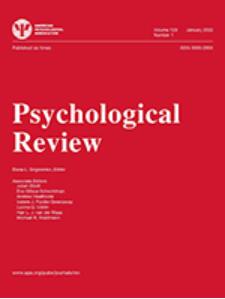通过文化学会控制:解释自我调节能力发展的差异。
IF 5.8
1区 心理学
Q1 PSYCHOLOGY
引用次数: 0
摘要
自我调节是一种目标导向的行为,涉及适应性决策。它包括多种认知和运动技能,受到复杂的社会文化环境的影响,对儿童的发展具有短期和长期的影响。然而,我们对自我监管发展的了解大多来自于在社区中进行的研究,这些社区并不代表全球大多数人口。要充分了解自我调节发展的复杂性,需要关于儿童学习的多样化和复杂文化环境的全球代表性数据。我们的目标是强调关于复杂的文化影响如何塑造自我调节发展的发现。基于对全球人口的研究,我们讨论了育儿环境、教育影响和环境压力因素对自我调节发展的影响。我们提供了基于经验的建议,以衡量自我调节的背景。我们的结论包括对未来研究的建议,以促进建立具有全球代表性的自我调节科学。(PsycInfo Database Record (c) 2025 APA,版权所有)。本文章由计算机程序翻译,如有差异,请以英文原文为准。
Learning to control through culture: Explaining variation in the development of self-regulation.
Self-regulation is a goal-directed behavior involving adaptive decision making. It consists of multiple cognitive and motor skills, is shaped by complex sociocultural environments, and has short- and long-term consequences for child outcomes. However, most of what we know about the development of self-regulation comes from research conducted among communities that are unrepresentative of most of the global population. To fully understand the complexities of the development of self-regulation requires globally representative data on the diverse and complex cultural environments in which children learn. Our objective is to highlight discoveries about how complex cultural influences shape the development of self-regulation. We discuss the impact of child-rearing environments, educational influences, and environmental stressors on the development of self-regulation based on research conducted with populations worldwide. We provide empirically based recommendations for measuring self-regulation in context. Our conclusion includes suggestions for future research to promote efforts to build a globally representative science of self-regulation. (PsycInfo Database Record (c) 2025 APA, all rights reserved).
求助全文
通过发布文献求助,成功后即可免费获取论文全文。
去求助
来源期刊

Psychological review
医学-心理学
CiteScore
9.70
自引率
5.60%
发文量
97
期刊介绍:
Psychological Review publishes articles that make important theoretical contributions to any area of scientific psychology, including systematic evaluation of alternative theories.
 求助内容:
求助内容: 应助结果提醒方式:
应助结果提醒方式:


